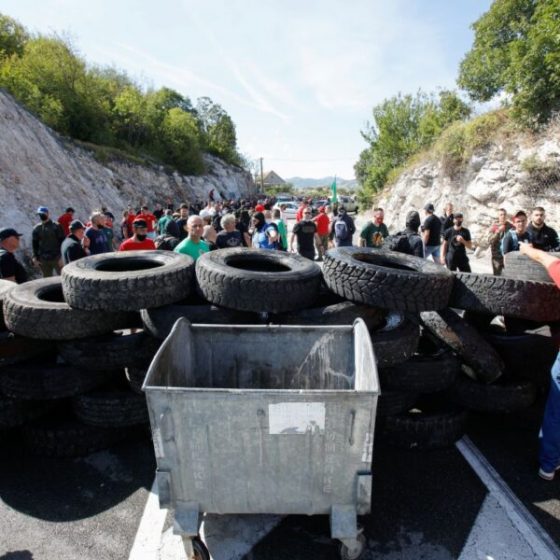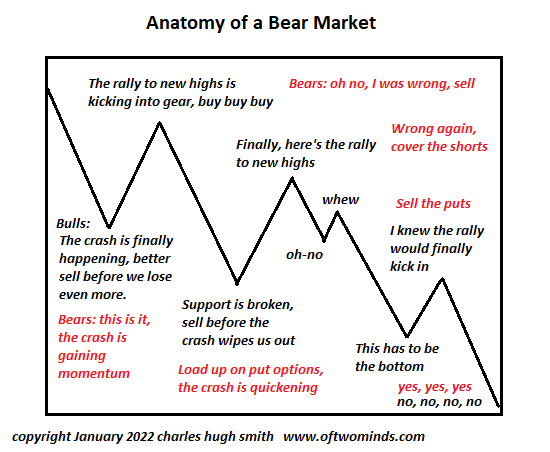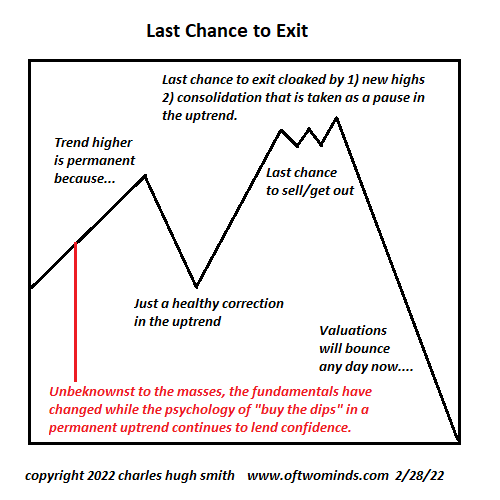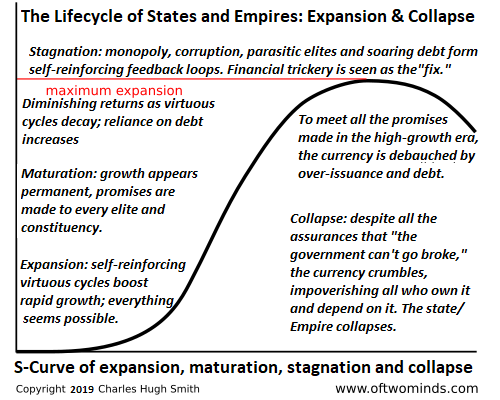
Our control is what’s irreplaceable. Wealth, status and the illusory security of reliance chains can not replace control.
What’s our individual technique for browsing tumultuous times? I’ve long advocated controlling as much as you can. We do not control the schedule of fuel and food from far away, or the government’s policies. However that doesn’t imply we’re helpless to impact our destiny.
From the viewpoint of systems, the way to understand control is to analyze each chain of dependency in our lives: the number of links are there between you and the source of what you need?
The higher the number of links, the higher the vulnerability of the chain, as once one link is broken, the entire chain stops working.
The suitable is total control of the source of fundamentals: there is no dependence chain at all. This self-sufficiency is incomplete due to our dependencd on globalized industrial production, however reducing our needs to a bare minimum significantly decreases our dependence and increases our control.
To put it simply, the other procedure of control is decreasing how much we require. If we just need a little quantity of money and essentials, then it’s naturally easier to get a little instead of have to obtain a lot just to survive.
Consider fresh water as an analogy. The water flowing out of your tap originates from far and needs a tremendous dependence chain of wells, tanks, pipelines, pumps, filters, etc all of which depends upon 24/7 electrical power.
If we gather rainwater off our roofing and filter/ shop it, the dependency chain is lowered to the weather condition offering rain.
If we lower water consumption, that also decreases our reliance.
If water is low-cost and easy to gain access to, we lose it. If we need to carry all our water in pails numerous hundred meters, we’re far more cautious about how the water is consumed. If we have to bring it a few kilometers, we’re extremely mindful.
Just how much we lose is totally within our control.
Shortening the reliance chain is at least partially within our control. If we stroll to a real farmer’s market (i.e. one in which the actual growers bring their produce to sell straight to consumers), this considerably minimizes the variety of links in the dependency chain compared to air cargo from other continents.
If we grow some of our own food in our lawn or a community garden, this removes the entire dependemcy chain (with the understanding that all food requires fresh water, garden compost and fertilizer).
We also control our direct exposure to toxic circumstances and individuals– situations and individuals who include corrosive, ineffective friction, waste and dysfunction to our lives. Minimizing or eliminating our direct exposure to these energy sinks lightens the load on our energy and time and minimizes our tension.
Persistent stress puts a stress on our physical and psychological health, hindering our immune system and minimizing the energy readily available to deal with pressing problems.
Reducing just how much money and resources we need minimizes our tension. Consider the difference in between owning property in a high-property tax state and one with low real estate tax as an example.
In a high-property state, one’s real estate tax may be $16,000 a year. (Existed and done that.) This requires somebody making $20,000 to 24,000 a year and paying taxes on that earnings to net the $16,000 needed to pay real estate tax.
$24,000 might not look like a lot of money to high earners, however with time it adds up. 10 years of $16,000 a year and needing to earn $24,000 (and pay $8,000 of that in federal and state income taxes) is startling: that’s $160,000 in property taxes, $240,000 in earnings needed to pay the property tax and $80,000 paid in earnings taxes on this $240,000.
Need to the family income decline sharly in a recession, that $24,000 a year simply to pay real estate tax may end up being consequential.
If our property taxes are $1,600 a year, it requires much less labor and anxiety to pay the property tax.
If the state collects income and sales tax, the family that earns less and spends less pays a lower tax concern.
Many of these components of control are subject to what I call a Devil’s Pact: we make compromises which we believe are useful but we have actually grossly undervalued what we’ve traded away and grossly overvalued what we’re getting by compromising what is really important.
In the classic Devil’s Pact, the person trades their soul to the Devil in exchange for some earthly advantage. At first blush, the advantage appears extraordinarily important and the soul of little value.
We endure violent scenarios where we have actually ceded power to sociopaths since the gains are so valuable. But we’re trading our health and life for chimeras of status and security that can disappear over night.
Just when the individual is trapped and helpless do they recognize far too late that they traded what was irreplaceable for a chimera of value.
Our control is what’s irreplaceable. Wealth, status and the illusory security of dependency chains can not replace control.
This essay was first released as a weekly Musings Report sent out specifically to subscribers and clients at the $5/month ($54/year) and higher level. Thank you, clients and subscribers, for supporting my work and totally free site.



< img align="center"src= "https://www.oftwominds.com/photos2019/Scurve-empires3-19.png"width="550"/ > My new book is now offered at a 10 % discount this month: Global Crisis, National Renewal: A(Revolutionary)Grand Strategy for the United States(Kindle$8.95, print$20)If you found worth in this content, please join me in seeking solutions by ending up being a$1/month client of my work via patreon.com. Recent Videos/Podcasts: Charles Hugh Smith on The Great Awakening Vision (Part II, 36 minutes,
with Richard Bonugli )Charles Hugh Smith on The Excellent Reset Agenda(Part I, 42 minutes, with Richard Bonugli) My recent books: Global Crisis, National Renewal
: A(Revolutionary)Grand Technique for the
)Check out the first area free of charge (PDF). Pathfinding our Fate: Preventing the Last Fall of Our Democratic Republic ($5 Kindle,$10 print,(audiobook): Read the very first area totally free(PDF) . The Adventures of the ConsultingPhilosopher: The Disappearance of Drake$1.29 Kindle,$8.95 print); checked out the first chapters free of charge(PDF)Cash and Work Unchained$6.95 Kindle,$15 print)Read the first area totally free Become a$1/month patron of my work via patreon.com. KEEP IN MIND: Contributions/subscriptions are acknowledged in the order got. Your name and email stay confidential and will not be given to any other specific, business or agency.
Thank you, Timothy K. ($ 10/month ), for your outrageously generous promise to this website– I am significantly honored by your assistance and readership. Thank you, Thomas S. ($60),

